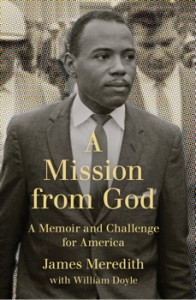
After telling about his interesting and rather eccentric life James Meredith begins his final chapter by writing:
I am an old man. I have spent almost eighty years on this earth. I hit the gym and take power walks almost every day, always wearing my Ole Miss baseball cap, and I’ve survived prostate cancer and many of the travails of old age. Shotgun pellets still dot my body, lying just under the skin like a harmless but abiding reminder of the sniper’s blast on that Mississippi roadside (June 6, 1966). Sometimes the pellets cause me considerable discomfort and occasionally they decide to just pop out of my body. I have seen cherished friends like Medgar Evers and Martin Luther King, Jr., get murdered by the beast of white supremacy, I have seen most of the lions of the civil rights era grow old and die, along with many friends and relatives. I have seen politicians and great political movements come and go. I was born into an empire of racial terror, and I have seen a black man become president of the United States. And somehow, I’m still here walking the earth (223-24).
When asked if his journey was worth it Meredith unflinchingly answers yes. Meredith has even discovered the great decency of many white Southerners who are often extremely kind and civil toward him, often expressing their deep appreciation for his role in the life and history of their state. He is honored at Ole Miss football games and follows the Rebels with fanlike devotion.
In 1966 Meredith was the most admired black man in America after Dr. King. In the years since he has fallen into obscurity, almost intentionally. He periodically spoke about this or that but people were not sure what to make of this unique man. In 1963, after he graduated from Ole Miss, he spoke in Chicago and called for “black sufficiency” and dared to criticize the younger rising black leadership of the time (e.g. Jesse Jackson, etc..) His remarks triggered a firestorm. In 1964-65 he traveled to Africa to do graduate studies in Nigeria. He even found his ancestral home in the nation that today is known as Benin. In 1965 he entered Columbia Law School and received his law degree in 1968. In 1966 Bobby Kennedy invited him to a private summit in his New York apartment. In 1967 Meredith shocked people again by endorsing Ross Barnett for governor of Mississippi. Some thought he was doing this as a kind of sadistic form of humor. Ever practical in his intentions James Meredith did it because he thought that Ross Barnett was the best man for the job. He says Barnett did more in private law practice to bring equal justice to blacks than any other man in fifty years in Mississippi. (I am telling you again, this man James Meredith is truly unique! He even challenged Adam Clayton Powell, the famous black congressman in Harlem who ended up resigning from the House in a disgrace years later, by seeking the nomination of the GOP.) But perhaps the most amazing fact of all is that Meredith wrote a number of U.S. congressmen and senators seeking a job for himself on their staff. The one guy who talked to him actually hired him–Senator Jesse Helms of North Carolina! Meredith says Helms was a “kindred spirit.”
Do you get my drift? James Meredith was, and still is, not the favorite son of a anyone’s cause. He is a prophet, pure and simple. He speaks his mind and challenges myths, left and right. He says that he finally left Jesse Helms’s staff in 1991 because, “He was too liberal for my tastes” (232). He then adds:
I am the American Don Quixote. Over the years I’ve led countless one-man marches across different stretches of Mississippi, announced my campaign for offices ranging from mayor of Jackson, Mississippi, to president of the United States, briefly started my own church, sold Amway products, and lectured to many audiences. Sometimes I lecture to large audiences and sometimes I lecture to empty rooms. Still I keep on moving (232).
Of his present life he concludes:
I think I have survived it all. Now, instead of being James Meredith, the celebrity, the honored one, I find I can be just James Meredith, the grandfather, the civilian, the citizen, the idiosyncratic American who is free to shoot his mouth off on anything he feels like talking about (232).
Related Posts
Comments
My Latest Book!

Use Promo code UNITY for 40% discount!





